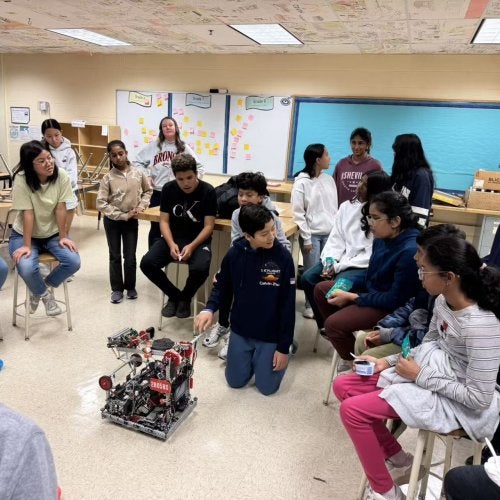
As school districts implement the ambitious Blueprint for Maryland’s Future to transform prekindergarten to post-secondary education statewide, they can rely on researchers at the University of Maryland College of Education for resources and expertise. Passed by the Maryland General Assembly in 2021, the Blueprint will invest more than $3.8 billion in public education over 10 years. EdTerps helped shape the Blueprint’s development and now actively support the implementation of all five of its pillars.
In addition to the major programs highlighted below, the College of Education supports each of the five pillars through faculty expertise, research, academic programs, school and community partnerships, and professional development for educators and school leaders.
Pillar 1: Early Childhood Education
The College of Education is addressing Maryland’s teacher shortage by putting more certified educators into communities where they’re needed most. This year, the college’s Center for Early Childhood Education and Intervention (CECEI) established the state’s first Child Development Associate (CDA) registered apprenticeship program for early childhood educators. Led by CECEI Executive Director and Clinical Professor Christy Tirrell-Corbin, the Maryland Early EdCorp Registered Apprenticeship Program offers paid on-the-job training within public and private early childhood programs dedicated to serving children and families with complex needs related to language barriers, poverty or disability. A new initiative through the program will focus on helping paraeducators and assistant teachers in school- and community-based preschool programs complete their CDA credentials, with a focus on inclusive practices.
Pillar 2: High-Quality and Diverse Teachers and Leaders
In one of its most innovative mandates, the Blueprint requires each Maryland school district to develop a teacher career ladder. By providing a clear pathway to career advancement, career ladders will help districts recruit and retain highly qualified teachers. Researchers from the College of Education’s Maryland PDS 2025 Project and the Center for Educational Innovation and Improvement (CEii) partnered with Prince George’s County Public Schools (PGCPS), Montgomery County Public Schools (MCPS) and both counties’ educators’ associations to develop a Teacher Career Ladder Framework. Districts can use the framework to guide the development of their own career ladders. The UMD team included PDS 2025 Director and Associate Professor Lawrence Clark, Director of CEii and Professor of Practice Segun Eubanks, PDS 2025 Project Manager and CEii Fellow Cherise Hunter, and CEii Postdoctoral Associate Pamela Callahan.
Pillar 3: College and Career Readiness
Recognizing literacy as a key element to future college and career success, the Maryland State Department of Education (MSDE) asked the Maryland Initiative for Literacy and Equity (MILE)–a partnership between UMD and Morgan State University–to lead a statewide review of literacy instruction. Under the direction of MSDE, MILE Director and UMD Associate Professor Donald J. Bolger, MILE Co-Director and Morgan State Associate Professor Simone Gibson Ph.D. ’09, and MILE Executive Director and UMD Associate Clinical Professor Maggie Polizos Peterson Ph.D. ’14 and their team recruited 13 literacy experts that visited 10% of public elementary schools in each Maryland county and the City of Baltimore in spring 2024. With the help of an additional 13 research associates, the MILE team also convened focus groups of elementary principals and educators and reviewed literacy plans and practices. MILE partnered with AIM Institute for Learning and Research to develop indicators that serve as the basis for reports for each of the 24 local educational agencies and the Blueprint’s Accountability & Implementation Board (AIB). The reports contain guidance and recommendations to improve the implementation of literacy instruction with the goal of helping every Maryland student read and write proficiently.
Pillar 4: More Resources for Students to Be Successful
In Fall 2022, the College of Education launched a doctoral program to train PK-12 educators to support the success of the multilingual learners who make up more than 10% of Maryland’s public school students. The first of its kind in the state, UMD’s Ed.D. in School System Leadership, Specialization in Teaching English to Speakers of Other Languages (TESOL) and Dual Language Education, prepares PK-12 leaders and administrators at school and district levels to address the academic, cultural and language needs of multilingual learners at school and district levels. Directed by Clinical Professor Drew S. Fagan, the program currently operates through a partnership with PGCPS and is available to the district’s leaders and administrators.
Pillar 5: Governance and Accountability
EdTerps have a seat at the table as the state evaluates the Blueprint’s outcomes and ensures that the legislation is implemented as intended. Laura Stapleton, chair and professor, Department of Human Development and Quantitative Methodology, is one of seven members of the Blueprint’s AIB, an independent unit of state government. Stapleton chaired the AIB’s Outcome Measures Workgroup, which identified possible measures to monitor the progress of Blueprint implementation.
Photo by iStock


